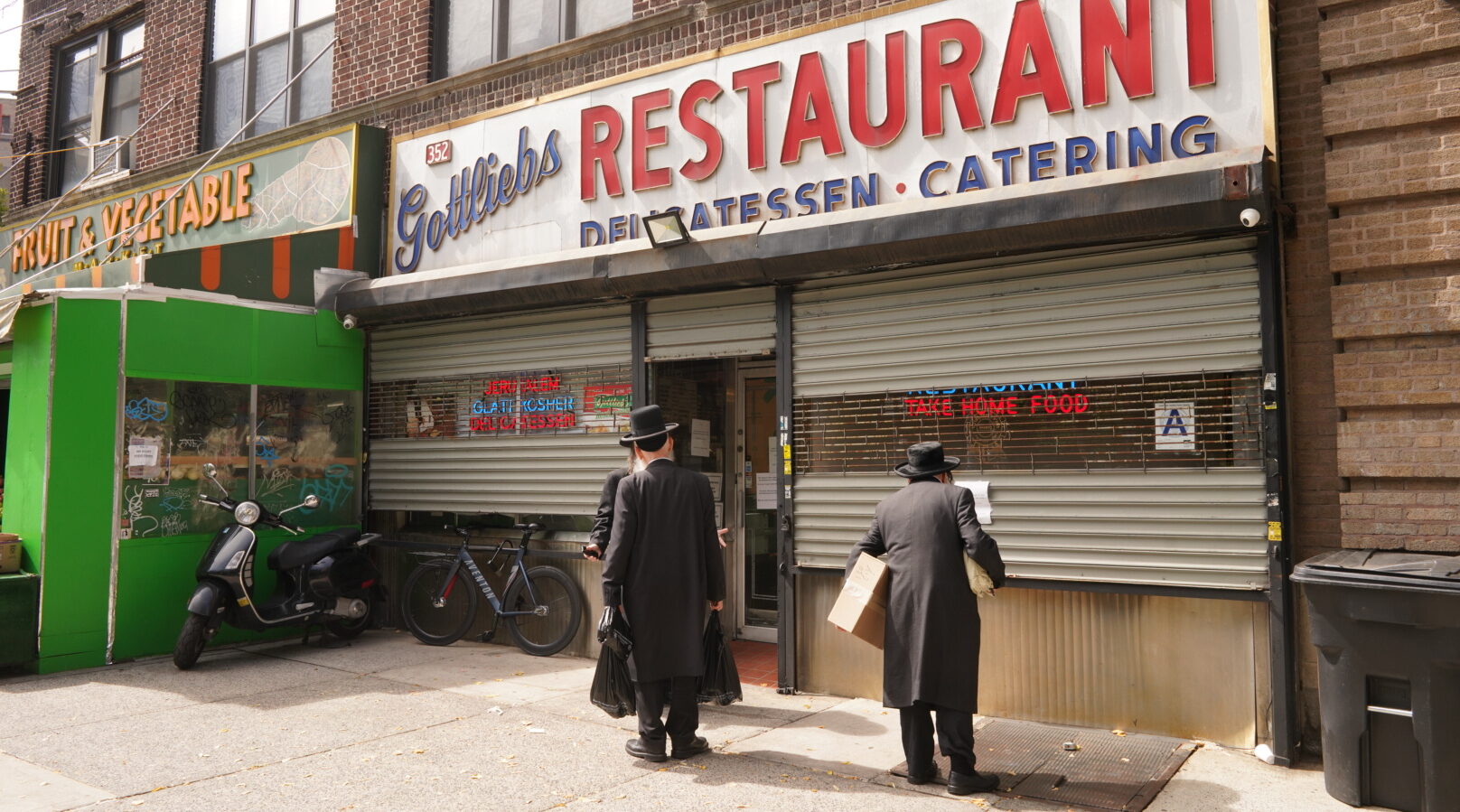Shabsy Parnes was on his way to Williamsburg on Thursday when news started to trickle out that Donald Trump would no longer be visiting the neighborhood.
The former president had planned to stop by a kosher restaurant in the Brooklyn Hasidic neighborhood, but the owner, Shulem Yoseph Gottlieb, died suddenly — throwing Trump’s campaign stop into question. Parnes still hoped to catch a glimpse of the candidate.
“I heard something but I figured it was going to happen anyway,” said Parnes, who grew up in the neighborhood and now lives in Monsey, a heavily Orthodox city in Rockland County. “Everyone was excited that a big person like that is coming down here so I came to see.”
Parnes was among a handful of disappointed Trump supporters and passersby in the Satmar Hasidic community who milled around on the sidewalk outside Gottlieb’s Restaurant on Thursday afternoon. Trump has spoken to Jewish audiences and conferences, but the Williamsburg event would have been a rare appearance where he could count on meeting rank-and-file Jewish supporters on the street.
Some in the group, who said they hoped he would reschedule his trip, praised his handling of the economy and what they see as his affinity for Jews. Others said Trump’s background in New York property development helped attract members of the community, where real estate and construction are a major part of the local economy.
“The vibe here yesterday was extremely holiday-like, it was very festive,” said Frieda Vizel, a former member of the Satmar community who now leads tours of the neighborhood. “The idea of Trump visiting this community was very monumental.”
Gottlieb’s son, Menashe Gottlieb, told the New York Jewish Week on Tuesday that the Secret Service was working to secure the restaurant and that Trump was set to make a brief, five- to 10-minute appearance. The restaurant had not received more detailed information, he said.
“We regret to inform about the passing of our father,” a sign on the restaurant door said, stating that the restaurant would be closed for the next week. Using the Yiddish word for joys, the sign added, “May we share only Simchas.”
Trump is popular among Williamsburg’s Hasidic Jews. In 2020, when Brooklyn overall voted in large numbers for Joe Biden, the Satmar area of Williamsburg was deep red, with some precincts casting more than 90% of their votes for Trump. This year, Trump’s campaign has cultivated support in the community. His son, Eric Trump, met with Satmar community leaders on Wednesday, the same day Trump held a rally in Nassau County.
Vizel said Thursday’s planned visit felt especially significant because the community — the subject of numerous documentaries, books and series scrutinizing its practices — feels starved for positive attention.
“There was a sense that the community is being seen. I think it was very validating,” said Vizel, who had stopped by the block on Wednesday night. “It was like, ‘We’re constantly being diminished in the news, we’re reported in documentaries and films in this dehumanizing way,’ and this was the moment.”
The restaurant stop was to be the first of three Jewish Trump events on Thursday. Later in the day, he is scheduled to speak about antisemitism in Washington, D.C., then address the conference of the Israeli American Council.
At both of those later appearances, Trump is expected to stress his record on Israel, a centerpiece of his pitch to Jewish voters. But that stump speech would not have played in Williamsburg: the Satmar community is ideologically non-Zionist.
“They like him because he goes for Jewish things more, not so much about the Zionism part,” Parnes said of Trump’s support in the neighborhood. Trump is unlikely to win New York State, Parnes said, “but at the end of the day he knows that the people like him here and I guess Trump likes to go where people like him, so it makes sense.”
Not all of the neighborhood was happy about the visit. One woman on the sidewalk shouted, “Trump is a piece of s—,” drawing pushback and questions from his supporters. “Because he’s nuts,” the woman said in justification.
Ariel Kohane, a Modern Orthodox Jew from the Upper West Side who had come down for the visit only to find out it was nixed, said he was “saddened” by the cancellation but understood it.
“It was completely justified and the family has to sit shiva for seven days. They can’t work so they can’t operate the restaurant,” Kohane said, as police officers loaded metal barricades into the back of a truck. “It was just a very unfortunate circumstance.”
The restaurant’s metal shutters were down on Thursday and employees were cleaning the interior. An American flag hung from the ceiling. Passersby stopped to peer inside through the windows and snap photos of signs announcing the funeral.
An employee of the restaurant said Shulem Gottlieb, 75, had experienced difficulties breathing in the past week and passed away at a hospital while undergoing treatment. He was a popular figure in the neighborhood, several passersby said. His funeral was held in Williamsburg on Thursday afternoon.
Jack, an employee of the restaurant who declined to share his last name, said there had been “a lot of excitement” at the store and in the neighborhood about the visit.
After Gottlieb’s death, the store “let the politicians know” that the restaurant was closed and the visit would need to be canceled, he said.
“This is the first president who comes, president or ex-president, such a high-ranking guy,” he said. “A lot of people like him because he did a lot of things for the Jewish people.”
The New York Jewish Week brings you the stories behind the headlines, keeping you connected to Jewish life in New York. Help sustain the reporting you trust by donating today.





